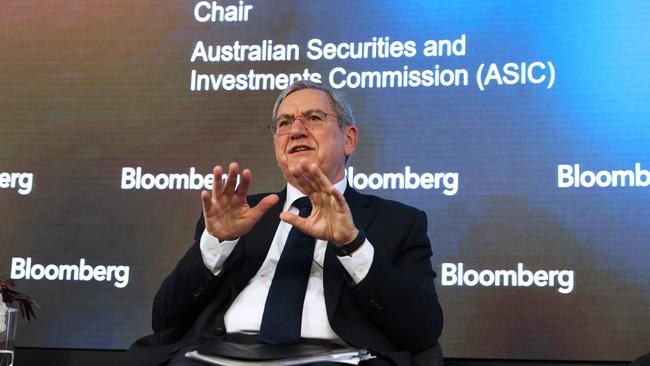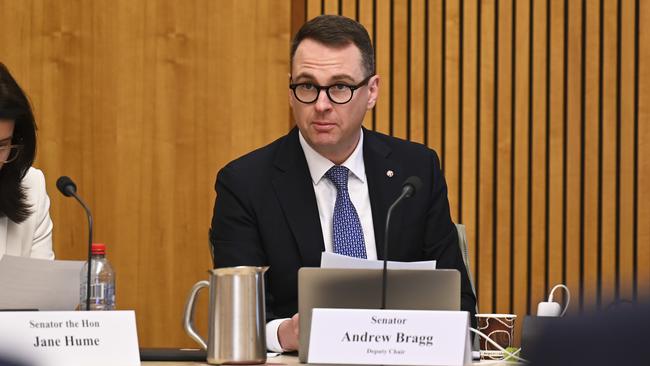ASIC split would requires a clear road map, says UK visionary Michael Taylor
Regulators and business figures say Australia’s corporate regulator should be split, but any successor must be supported in fighting financial crime.

Business
Don't miss out on the headlines from Business. Followed categories will be added to My News.
Regulators and business figures say Australia’s corporate regulator should be split, with a visionary behind the untangling of Britain’s “super-regulator” warning any successor must be supported in fighting financial crime.
Four weeks on from the latest inquiry into the Australian Securities & Investments Commission, former regulators and business figures have backed a call to investigate a split of the corporate regulator.
Liberal senator Andrew Bragg, who chaired the latest inquiry into ASIC, called for the agency to be split between a company regulator and a financial conduct authority. This could see Australia adopt a British-style model, spearheaded by their Financial Conduct Authority.
Britain split its “super regulator” in April 2013 into the FCA and the Prudential Regulation Authority in the wake of the Global Financial Crisis.
Speaking to The Australian four weeks after publishing the 206-page ASIC report, Senator Bragg said ASIC should be split into two agencies, one which handled business administrations, liquidations and registration and another to deal with the country’s financial sector.
“We have an enormously bloated financial sector, partially because of compulsory superannuation,” he said. “Running law enforcement in that world is almost a full-time job.”
Senator Bragg has also called for any financial regulator to adopt a “law enforcement” approach, saying an SEC-like agency was needed to fight financial crime.
He said ASIC or any enforcement agencies should achieve more Sam Bankman-Fried style outcomes, with a quick turnaround between charges and jail. “They need to drive a culture of fear of law enforcement,” he said.
Senator Bragg said the size of Australia’s financial system and its comparatively small population “presents an unusual set of challenges”.
Senator Brag said he was “not critical” of ASIC facing too broad a mandate, which has swelled since the Wallis review recommended the creation of Australia’s twin-peaks regulatory model.
“That’s parliament’s fault,” he said.
ASIC was recently handed back responsibility to run Australia’s business registers after the Morrison government attempted to pass the system to the Australian Taxation Office to run and modernise with a $1.5bn budget.
Senator Bragg said the decision should be “recalibrated”.

But Senator Bragg said there was “nothing unusual” about Australia, noting many other countries had large financial systems and had taken steps to ensure their regulators could deal with them.
Senator Bragg’s call for an ASIC split was not supported by all, with Labor Senator Jess Walsh issuing a statement hosing down the suggestion.
A spokeswoman for Senator Walsh, who declined to comment, directed The Australian to comments she made earlier, noting the “views from stakeholders who frequently interact with ASIC have largely been ignored in the chair’s recommendations, which assume ASIC will be split”.
Former ASIC deputy chair Jeremy Cooper said the regulator had a “massive mandate”, noting it was “hard to point to a regulator with quite that degree of scope”.
Mr Cooper, who has chaired retirement giant Challenger, said the current regulatory model was not working.
He said he had thought about a split, noting superannuation was the most obvious candidate to take outside APRA, leaving the regulator to deal with the run-off of defined benefits products.
“You’d drag funds management, the bulk of superannuation into ‘regulator B’ and with it you might put financial advice and non-APRA financial services,” he said. He said the superannuation sector was a key example of the drift over the past decades, with the industry split between ASIC and the Australian Prudential Regulation Authority.
“It made sense having it regulated like insurance and banking,” he said. “What’s happened now is super is really a funds management business, without the tax and management wrapper.”
But Mr Cooper said it was unclear how any split would work and whether ASIC just needed more resources.
“It’s not a lack of scrutiny in some respects; in some respects it’s got too much,” he said.
Writing in The Australian on Monday, former ASIC chair James Shipton said any split should recognise the regulator was “overburdened”, but noted there was no “easy fix”.
“The Senate report provides an opportunity to carefully consider what is the best regulatory system for Australia’s financial system. It is not just a matter of right-sizing ASIC,” he said.
“Establishing an effective regulatory system requires careful design of the regulator, the role of other public institutions within the system (like complaints handling services), and the prevailing rule book.”
“Put simply, if we were designing the regulatory system for the financial sector from scratch it is highly unlikely that we would design it as it currently stands.”
Veteran regulator Michael Taylor, who proposed a shake-up of Britain’s financial regulation scheme in 1995, almost two decades before it happened, said it was not enough to split ASIC; it was essential to ensure any regulator felt able to act independently.
“If you don’t have regulators who feel they have that independence and feel they can make those tough decisions you won’t get effective regulation,” he said.
Mr Taylor, who has held roles in multiple regulatory agencies, the Bank of England, and the International Monetary Fund, said an ideal set up would be to have two agencies, one focused on financial conduct and another for “everything else ASIC does”.
“In that sense you can use the UK experience as a kind of model,” he said.
Mr Taylor said any potential successor had to have clear objectives and responsibilities.
“Given the sheer range of functions that ASIC has, it’s always going to be difficult to give it that clarity of role and objectives,” he said.
“It would make sense to go for two separate agencies,” he said.
“If you want to get some greater clarity, you can’t do that with just reforming ASIC, you do need a more structural solution.”
More Coverage
Originally published as ASIC split would requires a clear road map, says UK visionary Michael Taylor





